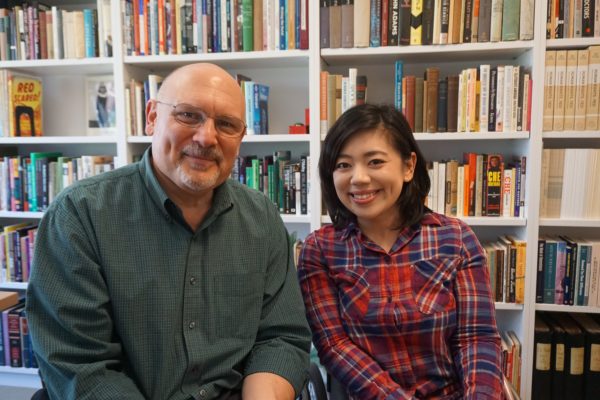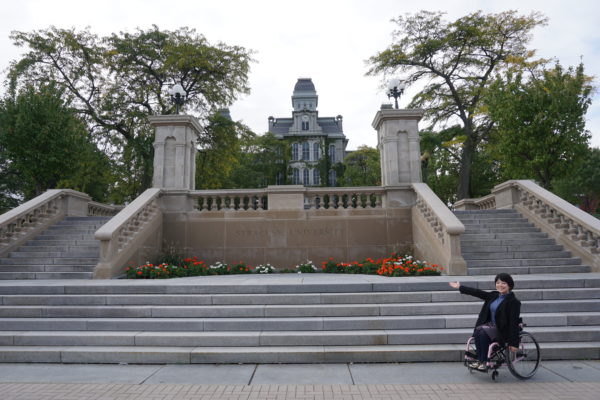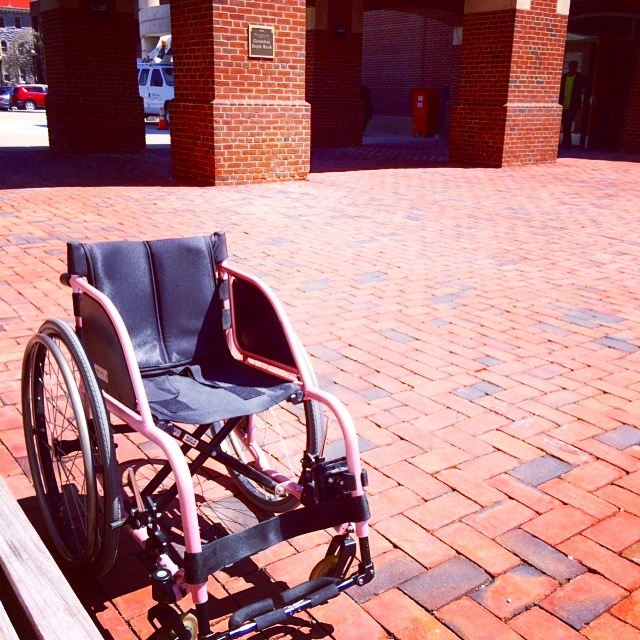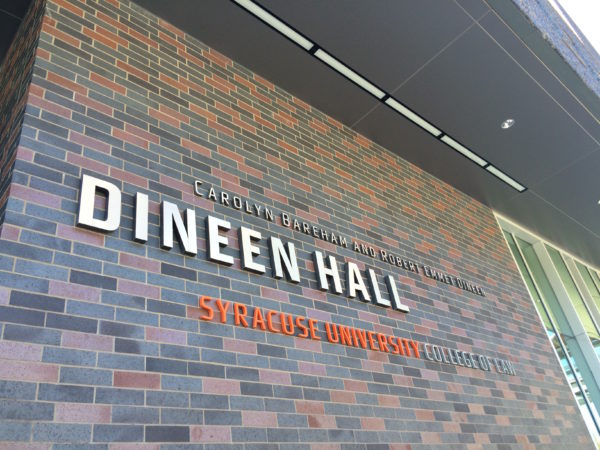この記事は次の言語でも読めます:日本語

Syracuse University where I have been working with since last October is the first college that started Disability Studies in the US. The campus is a very inclusive environment not only for students with disabilities but also for faculties with disabilities. Professor Michael A. Schwartz is a supervising attorney and director at Disability Rights Clinic under Syracuse University College of Law, and teaches disability law. He is Deaf.
In his early career, professor Schwartz worked at North Carolina school for the Deaf and saw discriminations against Deaf children. After he complained to American Civil Liberties Union, the conditions for the children got better and that made him want to learn laws.

In 1981, professor Schwartz received a Juris Doctor degree from a law school of New York University. At that time there were only 2 or 3 Deaf attorneys in the country. His first legal job was Federal judge in Manhattan. After 1 year, he went to Manhattan district attorney’s office and worked in appeals bureau for 8 years. While building his career in there, he met his wife and married her. After he practiced on his own for 3 years, he got a job with attorney general of State of New York. The office was just around the corner of from World Trade Center which was destroyed in the September 11 attack.
Afterwards, he received LL.M (Master of Law) from Columbia University and started working in National Technical Institute for the Deaf (NTID) in Rochester in New York. NTID is a technical college for students who are deaf or hard of hearing, and is located inside of the campus of Rochester Institute of Technology (RIT). Professor Schwartz wanted to be a professor at RIT to work with Deaf students who are going for a bachelors or masters. (NTID is for associate degree.) However RID told him that he cannot be a professor unless he has PhD. Under unavoidable circumstances, he entered University of Rochester. However he found that the accommodation at the college was terrible. He could not get ASL interpreter service where he needed. While he was upsetting, his advisor told him,
“Go to Syracuse University. Look up Steven Taylor.”
Steven Taylor is a professor who established Disability Studies in Syracuse University. Steven Taylor passed away because of cancer in November 2014, but has influenced many people as a researcher and professor even today.

Professor Schwartz left University of Rochester and entered Syracuse University for his PhD. While he was studying, Disability Rights Clinic on campus where he works now was opened in 2004. He got an offer to work in there and continued studying at the same time.
Though he has more than enough attractive educational background and working experiences, he had faced frustrations because of his disability when looking for a job in the past.
“In 1994, before I worked in Rochester, I applied 135 law firms in Manhattan. A third of them was big firm, a third of them was middle, a third of them was small. I made a mistake of putting on my cover letter and my résumé. I said one sentence -I am deaf and I read lips very well.- Eventually I received 135 rejection. It was after ADA. I have great educational background from prestigious colleges and working experience as a legal professional. This law firms saw from my letter that I was Deaf and rejected my application without giving me an interview despite my outstanding résumé.
Meanwhile, I found an ad of progressive law firm in Manhattan which represents women, unions, and people in color. That law firm looked perfect for me. That time I didn’t want to make the same mistake. I took the sentence -I am deaf and I read lips very well- out. Then, Bingo! I got an interview. I wore my suit and tie and grabbed my brief case and went to the law firm. The interviewer, a senior partner, came in and we shook hands. I was smiling and told him ‘I am Deaf.’ He looked so shocked what I just said.
As soon as the interviewer guided me to his office, he sat behind his desk, picked up the phone. I didn’t know if he was making a call or responding a call, but he picked up the phone swiveled his chair around to back to me. In the US, this attitude is considered very disrespect. 20 minutes later, he turned back and said,
‘We have no position open.’
I felt like he punched me in the stomach. I saw his advertisement of an open position, and when he said that he had no open positions. I knew he was discriminating against me. It was upsetting. The interviewer continued ‘It was nice to meet you.’ to me. Pretty much he kicked me out of his office. The law firm has worked progressively with minority, but they do very obvious discrimination against me. I couldn’t believe. I was so mad.”

In Japan, I wonder if many people with disabilities have had same kind of experiences. You don’t disclose your disability on résumé, and after getting an interview offer, you disclose your disability. Then the employer reject your application. I have the exact same experience (*1). For example, some global companies look progressive in inclusion and diversity from outside, but unexpectedly old traditional corporate culture still exits inside. If you disclose your disability from the beginning, employers would assume your situation beforehand (at least they don’t change their mind in the middle of interview process). However, if the employers have a wrong notion toward people with disabilities that people with disabilities cannot do many tasks, you might be offered less quantity and quality than you can actually handle. It would be great if you can find a real progressive company, but it is hard to find out.
Nowadays more people talk about diversity in Japan. In addition to people with disabilities, more LGBTQ or people from different culture and country would come into the society and apply for jobs in Japan. Those people are minority right now, but the number is increasing. Japanese employers should work on not only raising awareness for diversity of inside of company, but also preparing for proper screening systems of applicants from different backgrounds.

Now professor Schwartz has full time ASL interpreters from Monday to Friday, 9am to 5pm. (He works from home on Fridays.) Sometime the office is very quiet, but in his work, he doesn’t know when he gets a call or when his student comes to his office. So he works with ASL interpreters during full work hours. This accommodation is very common at other workplaces even in the US.
“Syracuse University asked me what I need which was very good. Some employers don’t do that.” Professor Schwartz said.
To create an inclusive working environment, employers are not ones who make decisions what to accommodate employees, but employers should ask employees what they need at first. In US, accommodation is discussed after hired. But in Japan, many employers ask applicants with disabilities about accommodation at interview. I understand that employers want to know beforehand what they need to provide for the application with disability. However, a job interview is a stage for employers to find talents and potentials of applicants and select ones who can do the jobs best, not to find ones who can work averagely without cost. To find the very best person, it would be better not ask about accommodations during the interview stage, because unconsciously the answer could be a major reason to refuse the candidate. Employers would need to have more optimized screening process since every candidate has different abilities from each other to do the job.
*1 I have shared my experience of job hunting when I disclose my disability in the article below.
Do You Disclose Your Disability on Your Résumé? ~Boston Center for Independent Living Part 2~
